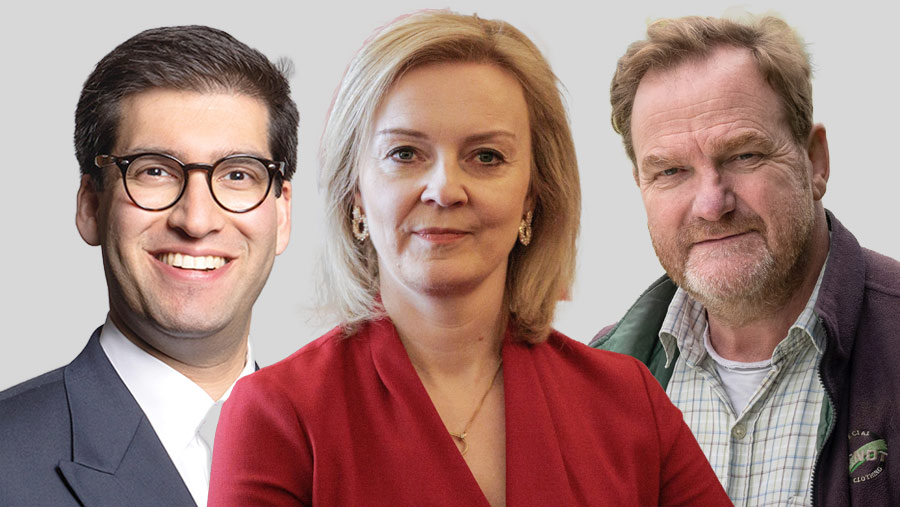Editor’s view: Cheers to Charlie, hello Liz and Ranil
 Ranil Jayawardena, Liz Truss and Charlie Flindt © UK Parliament, Adobe Stock, Kathy Horniblow
Ranil Jayawardena, Liz Truss and Charlie Flindt © UK Parliament, Adobe Stock, Kathy Horniblow This week, I have a very straightforward job indeed: Saluting the efforts of the inimitable Charlie Flindt.
As he explains in the News section (across two luxurious pages rather than his usual single), he is giving up arable farming operations, so he felt it seemed the right time to also end the weekly missives that were so intimately associated with those efforts.
Fortunately for Farmers Weekly readers, and his prodigious Hobnob bill, I want to assure you that this does not mean that he has graced these pages for the last time.
See also: Food security and productivity should top Liz Truss’ agenda, says industry
Final Flindt on Friday
Although the final Flindt on Friday will be published at the end of this month, he will still be popping up on a less frequent basis elsewhere in future.
For many of you, this will be an unwelcome end of an era, as I know how common it is for folk to turn to the final page of the magazine first on a Friday.
This is because Charlie is that rarest of writers – someone who never fails to both amuse and inform and, frequently, antagonise.
Best of all, he is absolutely never boring. The many hearty agreements and ripostes to his forthright views on our Letters page are testament to that, as are letters from readers to me.
So thank you, Charlie, for letting us into your life for so many years, and best wishes to you and Hazel with all your future plans. We’re all looking forward to hearing more about life after full-time farming.
To all of you wondering what will inhabit his normal page in future – I am kicking around a few ideas, but many more are welcome.
And we are always on the hunt for fresh writers who can communicate on the topic of farming with wit and wisdom.
New prime minister
Now that we’ve dealt with the important stuff, I suppose I should mention the change of prime minister.
As expected, it is now Liz Truss’ job to steer the ship of state into the future.
Looming over everything is how she will shield individuals and businesses from the energy crisis, with a package to cap bills reported to be worth £150bn on the way.
The viability of many enterprises rests on the success of this aid, including some in the food chain, as well as her ability to govern successfully until the next election without the issue completely dominating the political agenda.
Less is known about her environmental philosophy. There is little to indicate that she will put the issue at the centre of her agenda in the way Boris Johnson attempted to bill himself as the greenest PM in history.
New Defra secretary
New Defra secretary Ranil Jayawardena (a Hampshire native like Charlie) has no apparent background in the affairs of the department, but has previously been a full-throated backer of free trade while a ministerial underling at the Department for International Trade.
It will be for him to set out his priorities, but it is unlikely to have been an accident that his background is in trade policy instead of environmental affairs. He is likely to detest tariffs as much as his boss.
To gain a full Cabinet role at the age of 36 is a remarkable achievement, and he will be keen to demonstrate vigorous action between now and the next election to maintain his career trajectory.
Assisting him will be Mark Spencer, a chief whip under Boris Johnson and better known in farming circles as a former National Federation of Young Farmers’ Clubs chairman.
This is a demotion for the Rishi Sunak backer, and it will be interesting to see how he responds.
Whether the pair will show genuine leadership to tackle the big problems in agriculture or not remains to be seen.

